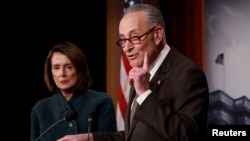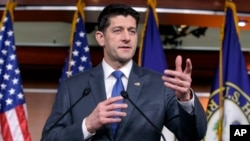U.S. President Donald Trump says he may veto a $1.3 trillion spending bill because it does not offer protections for young undocumented immigrants who arrived as children and does not fully fund the border wall.
In a Twitter post Friday morning, Trump said he is considering a veto of the omnibus spending bill based on "the fact that the 800,000 plus DACA recipients have been totally abandoned by the Democrats (not even mentioned in Bill) and the BORDER WALL, which is desperately needed for our National Defense, is not fully funded."
Previously, White House officials said Trump would sign the spending package, a move that would head off a potential government shutdown due to a lack of funding.
The measure funds the federal government through September 30. If Trump does not sign the legislation into law, the federal government will shut down at 12:01 a.m. Saturday.
The Senate passed the bill by a 65-32 vote early Friday morning after the House of Representatives approved the measure Thursday.
Lawmakers had just hours to read the nearly 2,200-page bill released Wednesday night.
Major legislation
With midterm elections looming in November, the bill likely marks the final time Capitol Hill considers major legislation this year. The measure fulfills Trump’s vow to boost military funding but provides funding for limited parts of his immigration agenda. The bill includes a 2.4 percent pay raise for military personnel.
After extensive negotiations between Republicans and Democrats, the bill also provides $1.6 billion for physical barriers and 150 kilometers of a wall at the U.S.-Mexico border, short of the $25 billion Trump requested for the project he repeatedly touted on the campaign trail while pledging Mexico would pick up the cost.
House Minority Leader Nancy Pelosi touted the agreement in a letter to her Democratic colleagues, saying negotiators "fought for and achieved drastic reductions to the Trump/GOP plan," including much less funding for the wall than Trump requested and a limit on the number of immigrants that can be detained by Immigration and Customs Enforcement.
Senate Democratic Leader Chuck Schumer said there was plenty of compromise in the spending package and that members of his party "feel very good."
"So many of our priorities for the middle class are included," Schumer tweeted. "From opioid funding to rural broadband, from student loans to child care, this bill puts workers & families first."
Despite Democrats' efforts, the bill makes no mention of protections for so-called Dreamers, undocumented immigrants brought to the United States as children. They were protected from deportation under the Deferred Action for Childhood Arrivals (DACA) program that began in 2012. Trump, however, rescinded the program late last year while giving Congress six months to come up with a permanent plan for the immigrants.
Democrats had called on Republican leadership to bring to a vote on the House floor a range of proposals that would fix DACA. Federal judges have, meanwhile, ordered the Trump administration to keep in place certain parts of DACA while legal challenges continue.
Addressing opioids, school safety
Republicans hold majorities in both the House and Senate, but there was not universal support in the party for the bill.
Both parties touted the $4.6 billion in total funding to fight the nation’s opioid addiction epidemic, and a record $3 billion increase for medical research at the National Institutes of Health.
House Speaker Paul Ryan said the measure tackles a number of critical programs, including boosting defense spending and funding for Veterans Affairs, as well as opioid treatment and drug enforcement, and improvements for roads, railways and airports.
Facing growing calls to address recent school shootings, lawmakers also included bipartisan legislation strengthening the federal background check system for gun purchases. The "Fix NICS’’ measure provides funding for states to comply with the existing National Instant Criminal Background Check system and penalize federal agencies that don’t comply.
"This doesn’t restrict gun rights in any way, shape or form," Republican Representative Tom Cole told reporters shortly before the vote. "The Fix NICS was very bipartisan and we all recognize there are gaps in the background system."
It also provides money to improve school safety, including training school officials and law enforcement officers on how to identify signs of potential violence and intervene early, installing metal detectors and taking other steps to "harden’’ schools to prevent violence.







